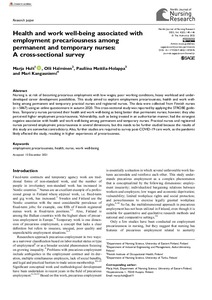Health and work well-being associated with employment precariousness among permanent and temporary nurses: A cross-sectional survey
Hult Marja; Halminen Olli; Mattila-Holappa Pauliina; Kangasniemi Mari
https://urn.fi/URN:NBN:fi-fe2022091258694
Tiivistelmä
Nursing is at risk of becoming precarious employment with low wages, poor working conditions, heavy workload and underdeveloped career development possibilities. This study aimed to explore employment precariousness, health and work well-being among permanent and temporary practical nurses and registered nurses. The data were collected from Finnish nurses (n = 5867) using an online questionnaire in autumn 2020. This cross-sectional study was reported by applying the STROBE guidelines. Temporary nurses perceived their health and work well-being as being better than permanent nurses; however, they also perceived higher employment precariousness. Vulnerability, such as being treated in an authoritarian manner, had the strongest negative association with health and work well-being among permanent and temporary nurses. Practical nurses and registered nurses perceived employment precariousness in several dimensions, but this needs to be further studied because the results of this study are somewhat contradictory. Also, further studies are required to survey post-COVID-19 care work, as the pandemic likely affected the study, resulting in higher experiences of precariousness.
Kokoelmat
- Rinnakkaistallenteet [27094]
